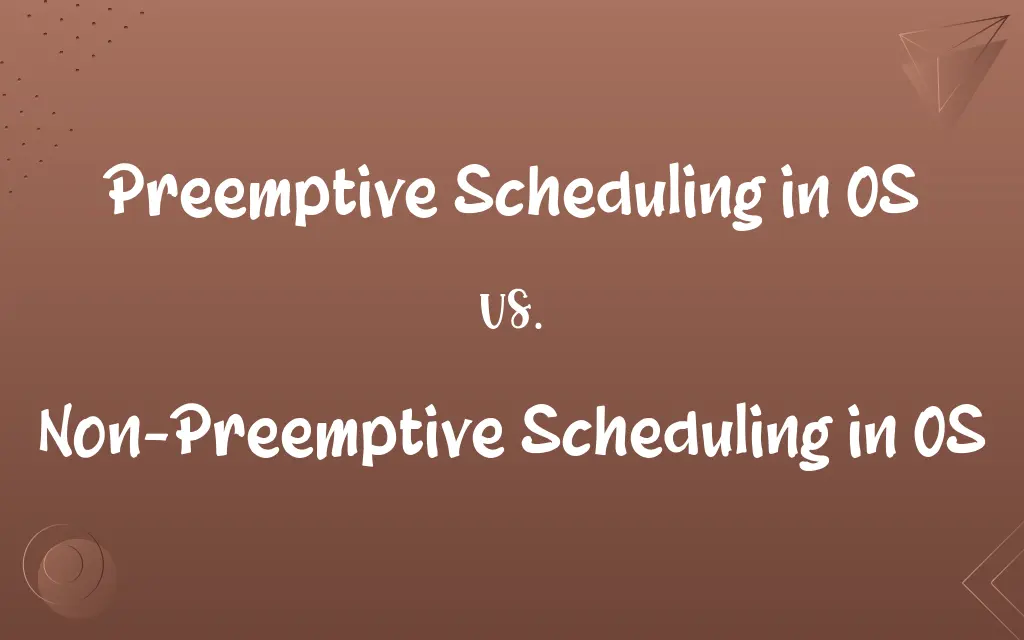Preemptive Scheduling in OS vs. Non-Preemptive Scheduling in OS: Know the Difference

By Shumaila Saeed || Published on February 29, 2024
Preemptive scheduling in an OS allows tasks to be interrupted and resumed, optimizing CPU use; non-preemptive scheduling completes each task before starting another, simplifying management but potentially reducing efficiency.

Key Differences
Preemptive scheduling in operating systems involves interrupting and resuming tasks based on priority or time slices. This method optimizes CPU usage by allowing higher-priority tasks to interrupt lower-priority ones. Non-preemptive scheduling, in contrast, requires a task to complete its execution before another task begins. This approach is simpler as it avoids the complexity of task switching.
Shumaila Saeed
Feb 29, 2024
In preemptive scheduling, a scheduler re-evaluates the priority of running tasks at regular intervals and can preempt (interrupt) a currently running task if a higher priority task arrives. This ensures more responsive and efficient task management. Non-preemptive scheduling, however, waits for a task to finish or reach a waiting state before starting a new task, which can lead to idle CPU time if a running task holds the CPU for long periods.
Shumaila Saeed
Feb 29, 2024
Context switching is more frequent in preemptive scheduling as tasks can be interrupted and resumed later, which might lead to overhead. Non-preemptive scheduling avoids frequent context switches, which reduces overhead but can result in less optimal CPU utilization, especially if a long-running task blocks others.
Shumaila Saeed
Feb 29, 2024
Preemptive scheduling is suited for time-sensitive applications where responsiveness is critical, as it allows urgent tasks to be processed quickly. Non-preemptive scheduling is simpler and more predictable, making it suitable for systems where tasks have similar priorities and execution times.
Shumaila Saeed
Feb 29, 2024
The complexity of implementation is higher in preemptive scheduling due to the need for managing task interruptions and resumptions. Non-preemptive scheduling is easier to implement as it follows a straightforward sequence of task execution without interruptions.
Shumaila Saeed
Feb 29, 2024
ADVERTISEMENT
Comparison Chart
Task Interruption
Allows interruption of running tasks.
Does not allow interruption.
Shumaila Saeed
Feb 29, 2024
Responsiveness
More responsive to urgent tasks.
Less responsive to urgent tasks.
Shumaila Saeed
Feb 29, 2024
Suitability
Ideal for time-sensitive applications.
Suited for tasks with similar priority
Shumaila Saeed
Feb 29, 2024
Implementation Complexity
More complex due to task management.
Simpler implementation.
Shumaila Saeed
Feb 29, 2024
ADVERTISEMENT
Preemptive Scheduling in OS and Non-Preemptive Scheduling in OS Definitions
Preemptive Scheduling in OS
It allows the OS to take control of the CPU from a task.
During preemptive scheduling, a background download might slow down when a user starts an application.
Shumaila Saeed
Jan 23, 2024
Non-Preemptive Scheduling in OS
Non-preemptive scheduling in OS completes a task before starting another.
In non-preemptive scheduling, a file download must complete before a print job starts.
Shumaila Saeed
Jan 23, 2024
Preemptive Scheduling in OS
Preemptive scheduling lets the OS interrupt a running task to start a higher priority task.
In preemptive scheduling, a real-time process can interrupt a background task.
Shumaila Saeed
Jan 23, 2024
Non-Preemptive Scheduling in OS
It minimizes context switching by keeping the current task active.
Non-preemptive scheduling ensures a system backup process runs uninterrupted by other tasks.
Shumaila Saeed
Jan 23, 2024
Preemptive Scheduling in OS
In preemptive scheduling, tasks are given time slices for execution.
A user’s video game might temporarily pause for a system update due to preemptive scheduling.
Shumaila Saeed
Jan 23, 2024
ADVERTISEMENT
Non-Preemptive Scheduling in OS
Non-preemptive scheduling is simpler but can lead to inefficient CPU usage.
A low-priority task can monopolize the CPU in non-preemptive scheduling, delaying a higher-priority task.
Shumaila Saeed
Jan 23, 2024
Preemptive Scheduling in OS
Preemptive scheduling ensures dynamic allocation of CPU time to processes.
Preemptive scheduling allows an antivirus scan to yield CPU for a user's video call.
Shumaila Saeed
Jan 23, 2024
Non-Preemptive Scheduling in OS
Non-preemptive scheduling ensures a predictable order of task execution.
In non-preemptive scheduling, a series of batch jobs execute in their exact submission order.
Shumaila Saeed
Jan 23, 2024
Preemptive Scheduling in OS
Preemptive scheduling prioritizes tasks based on urgency and importance.
An email application refreshes in the background through preemptive scheduling when a spreadsheet program is running.
Shumaila Saeed
Jan 23, 2024
Non-Preemptive Scheduling in OS
It allows a running task to continue until it finishes or voluntarily yields.
A long video rendering task in non-preemptive scheduling won’t stop for an incoming email check.
Shumaila Saeed
Jan 23, 2024
Repeatedly Asked Queries
How does non-preemptive scheduling work?
It allows a task to run to completion before starting another task.
Shumaila Saeed
Feb 29, 2024
Is preemptive scheduling more efficient than non-preemptive?
Yes, preemptive scheduling is often more efficient as it optimizes CPU time.
Shumaila Saeed
Feb 29, 2024
Does preemptive scheduling require more complex algorithms?
Yes, it requires complex algorithms to manage task prioritization and interruptions.
Shumaila Saeed
Feb 29, 2024
Is preemptive scheduling better for multi-user environments?
Generally, yes, as it allows better resource sharing and responsiveness.
Shumaila Saeed
Feb 29, 2024
Does preemptive scheduling improve system responsiveness?
Yes, it allows urgent tasks to be addressed quickly.
Shumaila Saeed
Feb 29, 2024
Is preemptive scheduling suitable for background processes?
It can be, as it allows important tasks to interrupt less critical ones.
Shumaila Saeed
Feb 29, 2024
Can non-preemptive scheduling be predictable?
Yes, it's more predictable due to the absence of task interruptions.
Shumaila Saeed
Feb 29, 2024
What is preemptive scheduling in OS?
It's a method where the OS can interrupt a running task to start a higher priority task.
Shumaila Saeed
Feb 29, 2024
Can non-preemptive scheduling be simpler to manage?
Yes, due to its straightforward execution sequence.
Shumaila Saeed
Feb 29, 2024
Can preemptive scheduling lead to context switching overhead?
Yes, due to frequent interruptions and resumptions.
Shumaila Saeed
Feb 29, 2024
Is non-preemptive scheduling suitable for real-time applications?
No, it's less suitable for real-time applications due to its lack of responsiveness.
Shumaila Saeed
Feb 29, 2024
Can preemptive scheduling handle multiple high-priority tasks efficiently?
Yes, by allowing them to interrupt lower-priority tasks.
Shumaila Saeed
Feb 29, 2024
Can non-preemptive scheduling cause CPU idle time?
Yes, especially if a long-running task blocks other tasks.
Shumaila Saeed
Feb 29, 2024
Does preemptive scheduling require more CPU resources?
Yes, due to the overhead of managing task switching.
Shumaila Saeed
Feb 29, 2024
Can non-preemptive scheduling lead to process starvation?
Yes, if a long-running task continually occupies the CPU.
Shumaila Saeed
Feb 29, 2024
How does non-preemptive scheduling handle priority tasks?
Priority is considered only when a task finishes or yields control.
Shumaila Saeed
Feb 29, 2024
Is preemptive scheduling more complex to implement?
Yes, due to the need for managing task preemptions.
Shumaila Saeed
Feb 29, 2024
Is non-preemptive scheduling easier to debug and maintain?
Yes, due to its straightforward and predictable task execution pattern.
Shumaila Saeed
Feb 29, 2024
How does non-preemptive scheduling affect system performance?
It can lead to less optimal performance if high-priority tasks are delayed.
Shumaila Saeed
Feb 29, 2024
Is preemptive scheduling common in modern operating systems?
Yes, it's widely used in modern multitasking operating systems.
Shumaila Saeed
Feb 29, 2024
Share this page
Link for your blog / website
HTML
Link to share via messenger
About Author
Written by
Shumaila SaeedShumaila Saeed, an expert content creator with 6 years of experience, specializes in distilling complex topics into easily digestible comparisons, shining a light on the nuances that both inform and educate readers with clarity and accuracy.







































































